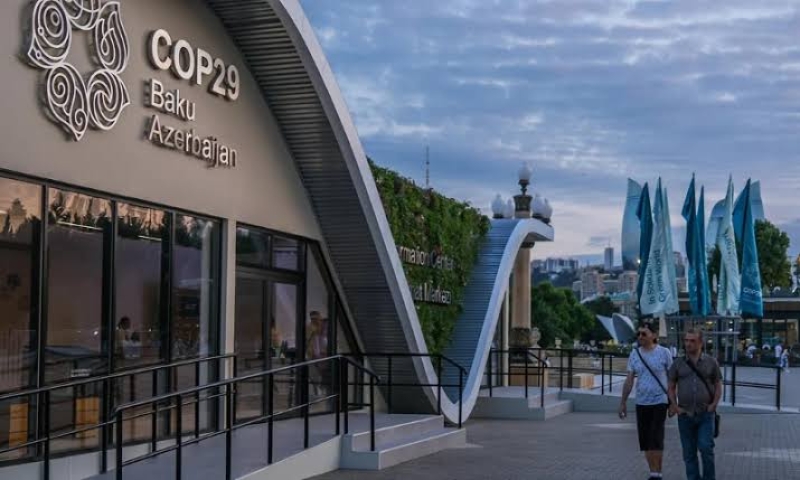- Dhaka's air quality in 'moderate' range on Saturday morning |
- Deadly Floods Displace Over 100,000 in South Sudan |
- Nepal has first woman Prime Minister as March elections set |
- 50 Killed as Israel Intensifies Strikes on Gaza City |
- UN General Assembly Endorses New York Declaration on Two-State Solution |
Climate Aid Pact Stalemate Threatens COP29 Progress

As the UN COP29 summit approaches, nations find themselves in a deadlock over a vital climate aid agreement. Disputes regarding funding responsibilities are jeopardizing the possibility of a comprehensive deal at the gathering set for next month.
Scheduled to begin just six days after the US elections, the potential return of Donald Trump—who previously withdrew the US from the Paris Agreement—casts a shadow over negotiations.
World leaders are expected to convene for a two-day session in Baku, Azerbaijan, a nation under scrutiny for its status as a petrostate with a history of limited dissent. Organizers anticipate over 50,000 participants from November 11-22, marking a significant global gathering in the capital.
COP29 has been labeled a "finance COP," as wealthier nations, largely responsible for climate change, are urged to significantly boost their financial commitments to developing countries. The current annual pledge of $100 billion is set to expire in 2025 and is widely viewed as insufficient to meet the urgent needs of poorer nations.
Key donors, including the European Union and the United States, have yet to disclose how much they are willing to contribute, facing mounting pressure to present even preliminary figures. Calls for transforming billions into trillions highlight the growing urgency for increased financial support amid political and economic instability in many donor countries.
"Complex Negotiations"
Azerbaijan, a former Soviet republic positioned between Russia and Iran, is advocating for meaningful progress as negotiations enter this "critical final stage." On Wednesday, government ministers will gather in Baku to attempt to bridge gaps.
"These are complex negotiations—if they were easy, they would have been resolved already," noted COP29 president Mukhtar Babayev, a former oil executive and Azerbaijan's ecology minister. "The eyes of the world are now upon them."
Observers have criticized the lack of climate leadership this year, as natural disasters—wildfires, floods, heatwaves, and drought—have struck globally. Current international efforts to curb greenhouse gas emissions fall short of the 1.5 degrees Celsius target established in the Paris Agreement.
Jim Skea, chairman of the Intergovernmental Panel on Climate Change, warned that without significant policy changes, we could be on track for a 3C rise in global temperatures by 2100.
Developing nations, which disproportionately suffer the impacts of climate change, are advocating for a deal at COP29 that secures over $1 trillion annually in climate finance—tenfold the current amount. They seek funding not only for low-carbon technologies and adaptation measures but also for disaster recovery, a demand resisted by many developed nations.
Greenwashing Concerns
While established industrialized nations reaffirm their commitment to funding, they are pushing for wealthy emerging economies to contribute as well—something developing nations flatly reject. "We should not let others turn away from their responsibility," stated Evans Njewa of Malawi, who chairs the Least Developed Countries group.
The potential return of Trump is exacerbating negotiation tensions. Michai Robertson, lead climate finance negotiator for the Alliance of Small Island States, noted increased hesitancy among typical contributors, as many await clarity on the future of US climate commitments.
With talks stalled, Azerbaijan has called upon fossil fuel producers to contribute $1 billion for climate action, pledging to lead by example despite its heavy reliance on oil and gas. Activists have denounced this as greenwashing, highlighting Azerbaijan's expansion of fossil fuel production.
Andreas Sieber from activist group 350.org expressed concern over Azerbaijan's reluctance to commit to phasing out fossil fuels, a pledge made at COP28 in the oil-rich UAE.
Grim Reality
COP29 marks the largest international event Azerbaijan has ever hosted, drawing unprecedented scrutiny to a state described by Human Rights Watch as "repressive." Recent crackdowns on dissent have raised alarms among organizations like Amnesty International and US senators, with critical voices facing imprisonment on questionable charges.
"The situation on the ground is quite grim... By the time Azerbaijan hosts COP29, there may not be much of a civil society left," remarked independent journalist Arzu Geybulla.
With COP29 overshadowed by the extravagant COP28 in Dubai, it remains uncertain how many world leaders will attend, as the next summit in Brazil is already seen as more significant.

